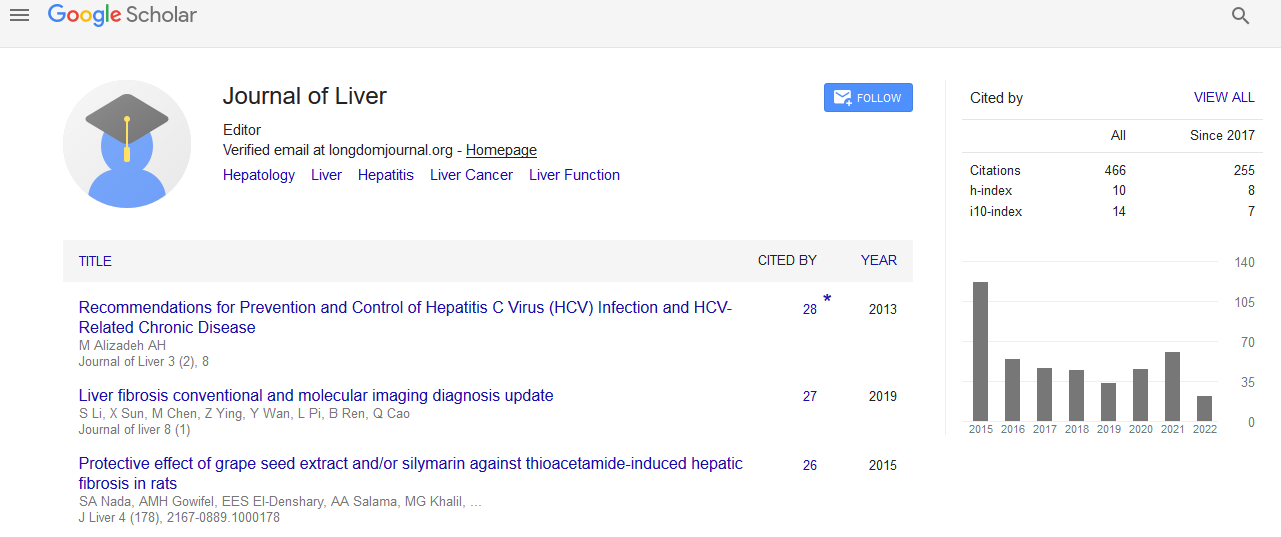PMC/PubMed Indexed Articles
Indexed In
- Open J Gate
- Genamics JournalSeek
- Academic Keys
- RefSeek
- Hamdard University
- EBSCO A-Z
- OCLC- WorldCat
- Publons
- Geneva Foundation for Medical Education and Research
- Google Scholar
Useful Links
Share This Page
Journal Flyer

Open Access Journals
- Agri and Aquaculture
- Biochemistry
- Bioinformatics & Systems Biology
- Business & Management
- Chemistry
- Clinical Sciences
- Engineering
- Food & Nutrition
- General Science
- Genetics & Molecular Biology
- Immunology & Microbiology
- Medical Sciences
- Neuroscience & Psychology
- Nursing & Health Care
- Pharmaceutical Sciences
Experience with a novel scheme of induction chemotherapy with FOLFIRINOX followed by maintenance therapy with 5FU/LV in pancreatic cancer
4th International Conference on Hepatology
April 27-28, 2017 Dubai, UAE
Alexander Hann, Wolfram Bohle and Wolfram Zoller
Katharinen Hospital, Germany
Ulm University, Germany
Posters & Accepted Abstracts: J Liver
Abstract:
Introduction: Chemotherapy regimens for pancreatic ductal adenocarcinoma (PDAC) have changed since the introduction of FOLFIRINOX. Due to toxicity, dosage and number of applied cycles are limited. In analogy to chemotherapy strategies in colon cancer we used a scheme of induction, maintenance and re-induction therapy in PDAC to alleviate such toxicities and increase the number of applied cycles. Here we report first experiences with this approach. Methods: We retrospectively identified all patients who received FOLFIRINOX for metastatic or locally advanced PDAC in our center using the induction and maintenance scheme from 2011 until February 2016. Response to therapy and toxicity of the treatment were assessed until September 2016. Progression free survival was assessed until progression during maintenance or treatment pause (PFS1) and until progression during re-induction therapy (PFS2). Results: 13 patients met the inclusion criteria. The median number of cycles of induction therapy including all three active substances or only 5FU/LV combined with Oxaliplatin was 6 (range 5-13). All patients had stable disease or partial response and received maintenance therapy consisting of 5FU/LV with a median cycle number of 6 (2-21). Re-induction due to progressive disease during treatment pause or maintenance therapy was applied in eleven patients using all three active substances or only 5FU/LV combined with Oxaliplatin, with a median of 4 (1-7) cycles of re-induction therapy. The median PFS1 was 10.6 months. The median PFS2 was 14.1 months. Conclusion: The use of induction treatment with FOLFIRINOX, followed by maintenance therapy with the option of treatment pause and re-induction in case of progressive disease is feasible in the palliative treatment of PDAC patients and might lead to a prolonged progression free survival with less toxicity.
Biography :
Alexander Hann is performing clinical and basic research focusing on pancreatic cancer since his first year as a Physician. His career has been started in 2009 at the University Hospital Marburg, Germany, were he studied the molecular mechanisms of pancreatic cancer. During his stay at the Katharinen Hospital Stuttgart, Germany, from 2011 to 2015 he extended his research work to clinical studies. His main focus is on the application of new chemotherapeutic approaches and the resulting survival benefit. Since 2015, he continued his wok involving clinical and basic research at the University Hospital Ulm, Germany.

